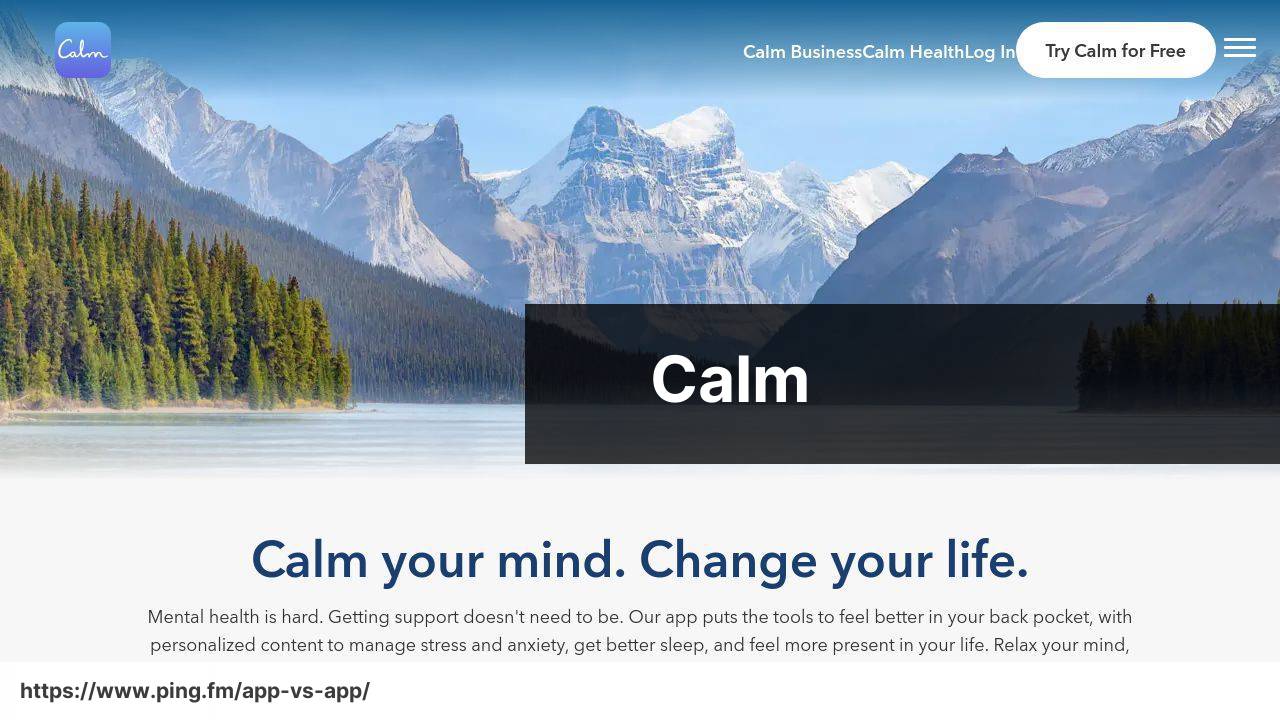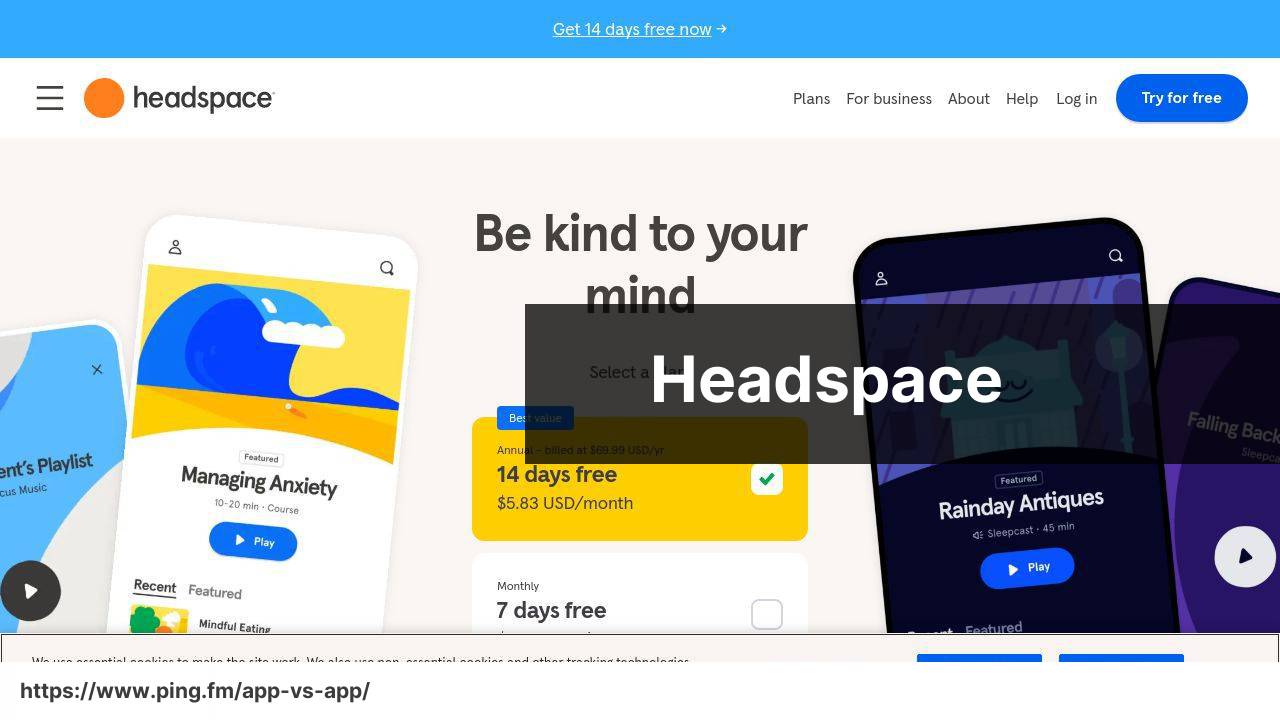Compare | Winner | |
| Ease of use | ||
| Variety of features | ||
| Quality of sleep Sounds | ||
| Mindfulness techniques | ||
| Sleep tracking | ||
| Design and Interface | ||
| Customizability | ||
| Stress & Anxiety Relief | ||
| Price | ||
| Reviews & Ratings | ||
| FREE / PAID | Calm utilizes a subscription model for monetization. They offer a 7-day free trial, after which it costs $69.99/year. | Headspace uses a subscription-based model. After a 2-week free trial, it costs $69.99/year. |
| Conclusion | With a variety of sleep needs addressed, Calm🍃is for those wanting diverse sleep options😴 👍 | Headspace🧘offers a well-rounded approach to sleep by incorporating mindfulness techniques💤 👌 |
Calm Pros & Cons
Wide range of sounds and stories🔊📘
User-friendly interface🤩
Offers sleep tracking 📊😴
Customizable Sleep Stories📖👌
Great stress relief options💆♂️
Headspace Pros & Cons
Mindfulness-oriented approach🧘
High-quality meditations💤
Excellent user interface design🌼
Includes Sleepcasts🔊
Great for stress and anxiety relief💆♂️
Offers training course for deeper sleep🛌📚
Subscription is quite pricey💰😞
Limited content for non-subscribers 🚫📘
Restrictions on multiple devices😔📱
No family sharing👨👩👦👦🚫
No offline mode📴😖
Interrupted with ads in free version😠💬
Fewer sound options🔊🚫
More expensive for subscribers💵😑
Less customizable than competitors👎
No family sharing option🚫👨👩👦👦
Limited features in free version🚫🎁
Other best apps for sleep
Prefer to create your sleep environment, Noisli🌊is best for custom sleep soundscapes🎧 🛌
For those seeking a practical approach with mindfulness, try 10% Happier📖 😌
Made for a soothing sleep experience, Relax Melodies🌙 is a musical treat🎵😴
FAQ
What are the outstanding features of the Calm app?
A popular mental wellness tool, the Calm app features guided meditations, sleep stories read by notable voices, calming music, nature sounds, and dedicated programs to manage stress, anxiety, and boost resiliency and concentration. The highlight is the ability to customize the duration and type of meditation exercises to suit individual needs.
How does the Headspace app support sleep?
The Headspace app’s arsenal to aid restful sleep includes wind-down exercises, sleep sounds, and relaxing meditation sessions. It also provides ‘Sleepcasts’, unique guided audios paired with soothing sounds to lull users to sleep. These features are designed to help users calm their minds and establish a wholesome sleep routine.
What are the main benefits of using sleep apps such as Calm and Headspace?
These apps offer guided mental exercises aiding relaxation, stress management, and sleep improvement. They can establish a regular meditation practice, which studies suggest can lower stress levels, improve focus, and enhance overall well-being. Interestingly, both apps have bedtime storytelling segments which can act as stimulus control therapy encouraging a healthy sleep habit.
Is there a cost associated with using the Calm and Headspace apps?
Are there different versions of the Calm and Headspace apps for children?
Yes, both apps feature content suitable for kids. Calm has sleep stories and programs specifically targeted at younger users. Similarly, Headspace includes mindful activities and sleep aids tailored to children and teens of various ages.
Can I download content for offline use in the Calm and Headspace apps?
Yes, both apps allow premium users to download content for offline use. This feature is handy when you are without internet access or want to save data.
Do the Calm and Headspace apps offer any personalized features?
Both apps offer personalized recommendations based on the user’s preferences and goals. Users can easily customize their experiences in terms of session duration, relaxation type, and other specific needs.
What operating systems support the Calm and Headspace apps?
Both Calm and Headspace are compatible with iOS and Android devices. Users can download them from the App Store or Google Play Store respectively.
Does using sleep apps like Calm and Headspace require any specific equipment or accessories?
No, using these apps requires only a smartphone or tablet and a stable internet connection. For a more immersive experience, you may want to use headphones or earbuds.
Are there any groups of users who may benefit more from using sleep apps like Calm and Headspace?
These apps provide valuable tools for anyone wanting to better manage stress, improve mental clarity, or enhance sleep quality. However, individuals with restless minds, high-stress jobs, or difficulty establishing a regular sleep routine may find them particularly beneficial.
Can the Calm and Headspace apps also be used on computers?
Yes, you can access both Calm and Headspace from the web, expanding their usability beyond mobile devices.
How user-friendly are the Calm and Headspace apps?
Both apps have intuitive interface designs allowing easy navigation even for non-tech savvy users. They also guide newcomers through getting started tutorials to help them better understand and utilize the apps’ features.
How regularly is new content added to the Calm and Headspace apps?
Both apps frequently update their content libraries with new meditations, sleep aids, and other resources to keep the user experience fresh and engaging.
Are the Calm and Headspace apps recommended by mental health professionals?
Many mental health professionals endorse the use of such apps to augment traditional therapy. However, it’s important to remember that these are supportive tools and shouldn’t replace professional help when needed. Always consult a healthcare provider before starting any new mental health regimen.
How are sleep problems addressed in the Calm app?
Calm provides a range of resources for sleep support including sleep stories, calming nature sounds and guided sleep meditations to help users relax their minds and shift towards sleep with a positive state of mind.
What resources does Headspace offer for managing anxiety?
Headspace offers a wide range of meditations specifically designed to cope with anxiety. These include short, stress-relieving exercises for immediate relief and extended audio sessions exploring the nature of anxiety and how to manage it.
What are ‘Sleepcasts’ in the Headspace app?
‘Sleepcasts’ are unique to Headspace. They are long, guided audio experiences that mix soothing narration with ambient sounds to aid sleep. Each is about 45-55 minutes long and starts with a brief, relaxing activity followed by a narrative journey to calm and rest the mind.
Are there any studies validating the effectiveness of the Calm and Headspace apps?
Both apps have been part of scientific studies suggesting their effectiveness. Many users report benefits such as improved sleep quality, reduced stress and anxiety, and enhanced focus and well-being. However, it’s essential to remember that individual experiences and results can vary.
How secure are the Calm and Headspace apps in terms of user data?
The privacy policies of both apps affirm their commitment to high standards of privacy and data security. They use encryption and other robust security measures to protect user information. More details can be found in the privacy sections on their respective websites.
Can I cancel my premium subscription for the Calm and Headspace apps if I’m not satisfied?
Yes, both Calm and Headspace offer the option to cancel your premium subscription at any time. The process varies slightly between platforms, and detailed instructions can be found in the support sections of their respective websites.
Which applications can assist with sleep improvement?
There are numerous applications available such as Calm and Headspace that are designed to support better sleep through meditation, engaging audio stories, relaxing music, and more.
What features make the Calm app effective for sleep improvement?
Calm provides a suite of offerings like guided meditations, calming audio stories, breathing programs, stretching exercises, and relaxing music, all of which can improve sleep quality.
How is the Headspace app beneficial for sleep?
Headspace offers the Sleepcast feature, which includes relaxing audio stories meant to prepare you for deep, restful sleep. It also provides guided meditations and exercises suitable for before bed.
Do the Calm and Headspace apps have free versions available?
Yes, both Calm and Headspace provide free limited versions. However, to unlock all features, a subscription is required.
Can I use Calm and Headspace on different devices?
Yes, both Calm and Headspace are compatible with various devices including smartphones, tablets, and computers.
Are these sleep improvement apps easy to use?
Both Calm and Headspace are user-friendly with intuitive interfaces, making them easy to navigate even for beginners.
How often should I use these sleep apps for the best results?
Using these apps consistently every night before going to sleep can yield the best results in improving sleep quality.
Can Calm help me fall asleep faster?
Calm‘s offerings are intended to relax your mind, reduce stress and anxiety, and therefore can potentially help you fall asleep more quickly.
What is the Sleep Stories feature in Calm?
Sleep Stories are bedtime stories for adults designed to aid in falling asleep. They offer a calming way to transition from your busy day to peaceful rest.
Do Headspace‘s Sleepcasts change every night?
The narrative of Headspace‘s Sleepcasts varies slightly each night to keep things fresh, yet they maintain the same relaxing tone to soothe the listener to sleep.
Are there any other apps similar to Calm and Headspace?
Yes, there are other apps such as Insight Timer, Sleep Cycle, and Slumber that also offer sleep-related features.
Does Headspace offer personalized sleep guidance?
Headspace has a personalized plan called the Sleep Suite, tailored based on your sleep habits and conditions.
Is Calm just for sleep?
While Calm is well-known for its sleep aids, it also offers resources for mindfulness practices, stress management, and guided meditations.
Does Headspace only focus on sleep?
While sleep forms a large part of Headspace‘s offerings, it also provides guided meditations, mindfulness exercises, and aids for stress and anxiety management.
Does Calm have any programs for children?
Yes, Calm includes a section named Calm Kids, offering guided meditations, sleep stories, and lullabies suitable for children.
Does Headspace offer assistance for individuals dealing with insomnia?
Yes, Headspace offers specific courses and meditations targeted at helping people who have difficulty sleeping or suffer from insomnia.
Which app is better: Calm or Headspace?
Choosing between the two depends on individual needs and preferences. While both apps are highly rated and offer sleep assistance features, it’s best to try both and choose which one resonates the most.
Is there any scientific evidence to support the effectiveness of these sleep apps?
Some clinical research suggests that regular use of apps like Calm and Headspace can help improve sleep quality and decrease anxiety and stress levels.
Are all the features inside these sleep apps voiced by professionals?
Yes, both Calm and Headspace have their sleep stories, meditations, and features voiced by professionals for optimal output and relaxation experience.
How is the sound quality in Calm and Headspace?
Both Calm and Headspace maintain high standards of recording quality to ensure users have a clear, uninterrupted listening experience.
 ping.fm
ping.fm 

